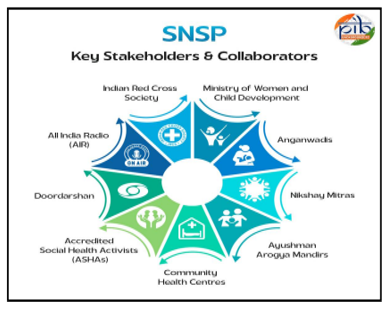SYLLABUS
GS-2: Issues relating to development and management of Social Sector/Services relating to Health.
Context:
Recently, the prime minister of India launched the Swasth Nari Sashakt Parivar Abhiyaan (SNSPA) and 8th Rashtriya Poshan Maah to strengthen healthcare services for women and children across India.
Swasth Nari Sashakt Parivar Abhiyaan (SNSPA)
- The SNSPA was launched on 17 September 2025 by the Prime Minister of India and will run till 2 October 2025.
- It follows the Jan Bhagidaari model with active community and private sector participation.
- SNSPA is jointly implemented by the Ministry of Health & Family Welfare (MoHFW) and the Ministry of Women & Child Development (MoWCD).
- The SASHAKT portal ensures real-time monitoring, accountability, and transparency.
- The 8th Rashtriya Poshan Maah is being celebrated from 17 September to 16 October 2025, aligned with the Swasth Nari, Sashakt Parivar Abhiyaan through Anganwadi Centres nationwide.
- Poshan Maah focuses on nutrition awareness: reducing oil and sugar intake, promoting local diets, infant and young child feeding practices, and early childhood care.
Key Interventions of the Abhiyaan
- The abhiyaan will organise over one lakh health camps at Ayushman Arogya Mandirs, Community Health Centres, and other facilities.
- It will cover comprehensive screenings for anaemia, hypertension, diabetes, breast and cervical cancer, reproductive health issues, tuberculosis, sickle cell disease, and skin problems.
- Maternal and child healthcare support through antenatal check-ups, immunisation drives, counselling services, and Mother and Child Protection (MCP) cards.
- Beneficiaries are linked to schemes such as the Pradhan Mantri Jan Arogya Yojana (PM-JAY), Ayushman Vaya Vandana Yojana, and the Ayushman Bharat Health Account (ABHA).
Objective of the SNSPA

- Enhance Women’s Health Through Comprehensive Screening and Services: SNSPA ensures women’s health through extensive screenings, specialised counselling, and follow-up care for diseases like anaemia, TB, Sickle Cell Disease (SCD), cancers, and reproductive issues, supported by experts and health facilities nationwide.
- Promote Family Well-Being via Maternal and Child Care: The Abhiyaan strengthens maternal-child health through ANC check-ups, immunisation, Mother and Child Protectioncards (MCP), nutrition awareness, and counselling, reducing mortality and aligning with Poshan 2.0 and Viksit Bharat 2047
- Foster Behaviour Changes Through Education: SNSPA educates communities on menstrual hygiene, nutrition, and wellness via Anganwadi workshops, promoting sustainable practices, breaking taboos, and encouraging Nikshay Mitra enrolment to achieve national health and behavioural transformation goals.
- Encourage Community Participation and Public Awareness: By adopting a Jan Bhagidaari model, SNSPA engages private hospitals, citizens, and local leaders through outreach campaigns, fostering awareness on women’s health, family well-being, and sustainable empowerment at the community level.
Strategic Significance of the SNSPA
- SNSPA promotes nutritional awareness under Poshan 2.0 to reduce maternal and child mortality.
- It aligned with Mission Shakti, Poshan 2.0, Swachh Bharat Abhiyaan, and Viksit Bharat 2047.
- It complements existing health schemes such as Janani Shishu Suraksha Karyakram (JSSK), Janani Suraksha Yojana (JSY), Surakshit Matritva Aashwasan (SUMAN), Mission Indradhanush, Pradhan Mantri Surakshit Matritva Abhiyan (PMSMA), Pradhan Mantri Matru Vandana Yojana (PMMVY), and the Suposhit Gram Panchayat Abhiyaan.
Source:
PIB
Rajbhavan
News On Air

